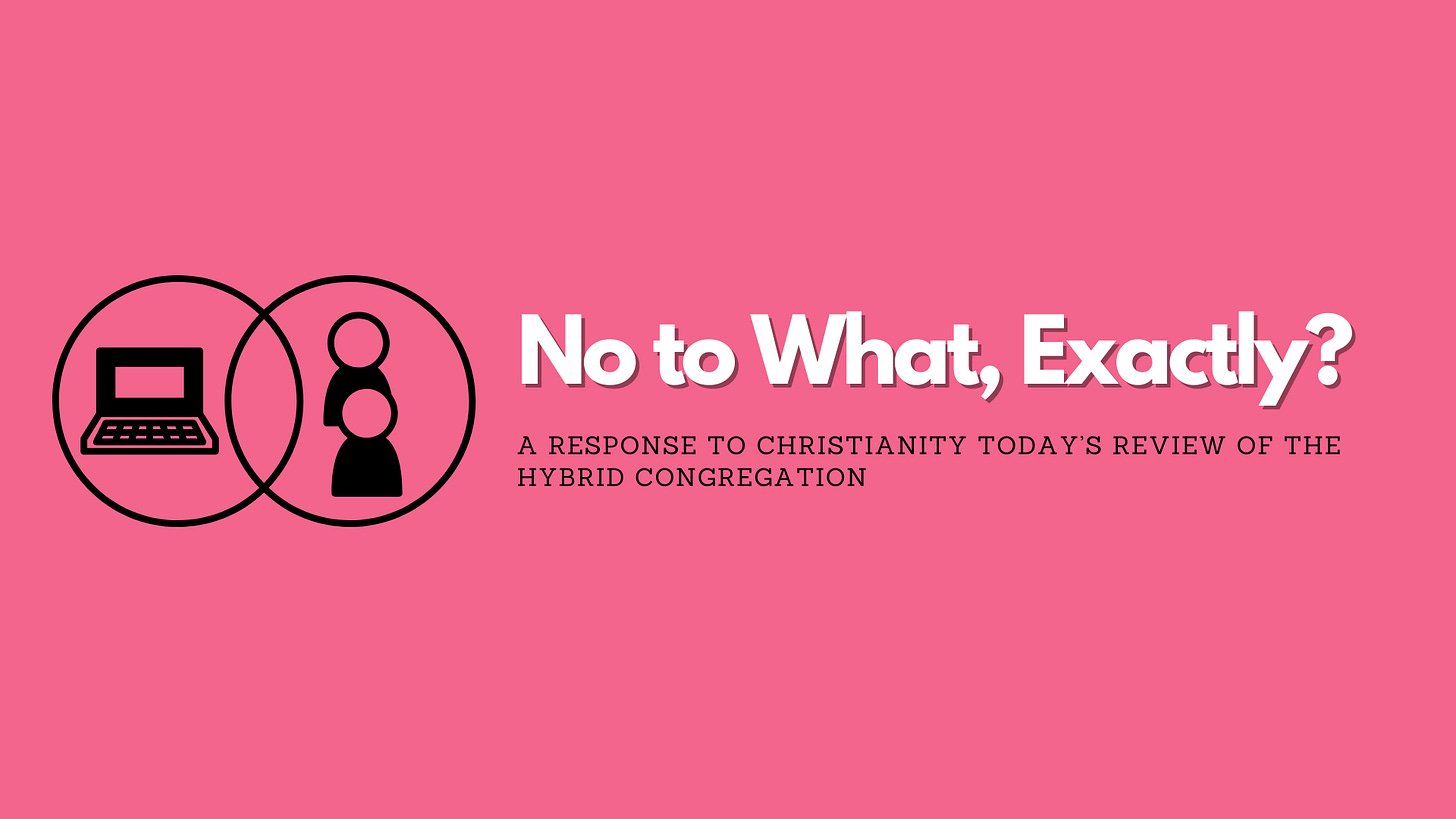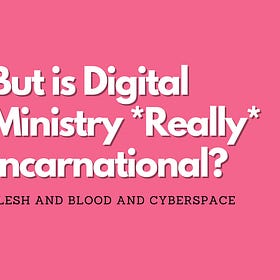No to What, Exactly?
A Response to Christianity Today’s Review of The Hybrid Congregation
I’d like to take a stab at the Christianity Today article “Just Say No to Online Church” by Brad East, a critique of Michael Huerter’s book The Hybrid Congregation.
East begins by referencing Karl Barth’s essay, “Nein!,” which was a call to reject theology not grounded in the Word of God. He uses this framework to imply that while he’s tempted to say the same about Huerter’s book, he’ll instead engage with it.
But I don’t think that’s what happens here.
What East is saying no to is not digital church—he’s saying no to digital people.
And that distinction matters.
Heretics & Harry Potter
East claims Huerter isn’t a heretic, then proceeds to treat him like one anyway. This isn’t a fair-minded critique. It’s a hit piece. A theological power grab dressed as engagement.
Take, for instance, East’s dismissal of the communities Huerter names at the end of his book—groups like Harry Potter and the Sacred Text. Sure, that example might raise eyebrows, but labeling such communities as “neither Christian nor religious” undermines online ministries like mine—digital-first churches that are unapologetically Christian and doing meaningful work in sacred spaces.
East is quick to label Huerter’s work as pragmatic or overly practical, but I’d offer different words: inclusive, incarnational, and even missional. His repeated critique of practical theology and ethnography, as mistaking an 'is' for an 'ought,' misses the point entirely. If the “is” comes from actually living among people who’ve been abandoned by the traditional church, maybe that “ought” is worth listening to.
An Appeal for Examples
East challenges Huerter’s claim that we can no longer draw a firm line between online and offline life. “Who says?” he asks. “Show me the evidence.”
Okay. Here’s the evidence: you’re reading this right now on a digital screen.
You’re participating in the very collapse of that boundary.
Here are some more:
When someone in our community posts a prayer request at 3:12 a.m., someone else replies.
Contrary to East’s assertion, Communion happens across screens. No one asked if the Wi-Fi signal was strong enough for sacrament. We just showed up. That’s not theory—it’s ministry.
East accuses Huerter of refusing to consider that digital church might not be valid. But that’s a misread.
Huerter’s not uncritical—he’s pastoral. He starts with the assumption that people engaging online are worth engaging. That they matter. That digital space is real space. That real faith can form there.
When we assert things like this, we aren’t saying that the digital church needs to prove its worth. We’re putting the onus on digital people. And this is anti-Gospel. Our worth is not our own, and atonement is not exclusive. We are reaching people online because Jesus told us to go therefore and make disciples. Not to prove they are worthy of being called legitimate.
On Assumed Depravity
The essay repeatedly assumes that the internet and digital devices are irredeemably depraved. That it deadens our senses, numbs our souls, keeps us from prayer, blinds us to beauty. East writes that screens are tools of “distraction, sedation, and enfeeblement.”
If we play the same semantics game that East does, then who says? I disagree.
I use mine to pray. I use mine to connect with people in ways pews never allowed. I’ve seen beauty through games, glory through art, and holiness in livestream chats. I’ve never been more alive to the gift of existence than when someone whispers, “I didn’t think the church had room for me… until I found yours.”
And yes, predictably, East closes with a reference to Snow Crash. Because it’s apparently impossible to critique digital ministry without dragging out the same old sci-fi cautionary tale. Can we stop pretending that quoting Neal Stephenson is a theological mic drop?
Look—if you want to opt out of digital tools in your own ministry, go ahead. That’s your call. They are just tools.
But if you’re saying no to online people—to the ones Jesus is already meeting on Twitch, YouTube, Discord, and TikTok—then I can’t affirm that.
I’ll keep saying yes.
Yes to connection.
Yes to communion.
Yes to the Body of Christ, even when it logs in from a different IP.
Want to keep reading more in line with these thoughts? Here are some next steps:
The Replaceable Church
As a digital church plant pastor, I see it as my mission to learn as much as possible to navigate the complex, ever-changing digital landscape that is my calling. Digital church is confusing, exhilarating, and overwhelming—and I’m all in.
But is Digital Ministry *Really* Incarnational?
A few months ago, I reached out to my peers in ministry on social media and asked what questions they had about digital ministry. One of the questions was from Jeremy, who asked:
World 3-17 Complete
Want to keep saying yes to digital people?
Join the Digital Missional Network—a community of doers, not just defenders. Whether you're streaming, posting, pastoring, or just figuring it out, you don’t have to build this alone. Let's learn, share, and embody the gospel together—online and on purpose.
Q: Why did the church board install a chatbot?
A: To finally get someone to volunteer.







Thank you. The main response I feel I can answer to someone who paints the things that matter and have transformed my life - not always without blemish, but I can say equally the same of analog church - is to simply continue to let actions speak by continuing to pursue the amazing, beautiful, and good parts of life both on and off its online and offline networks.